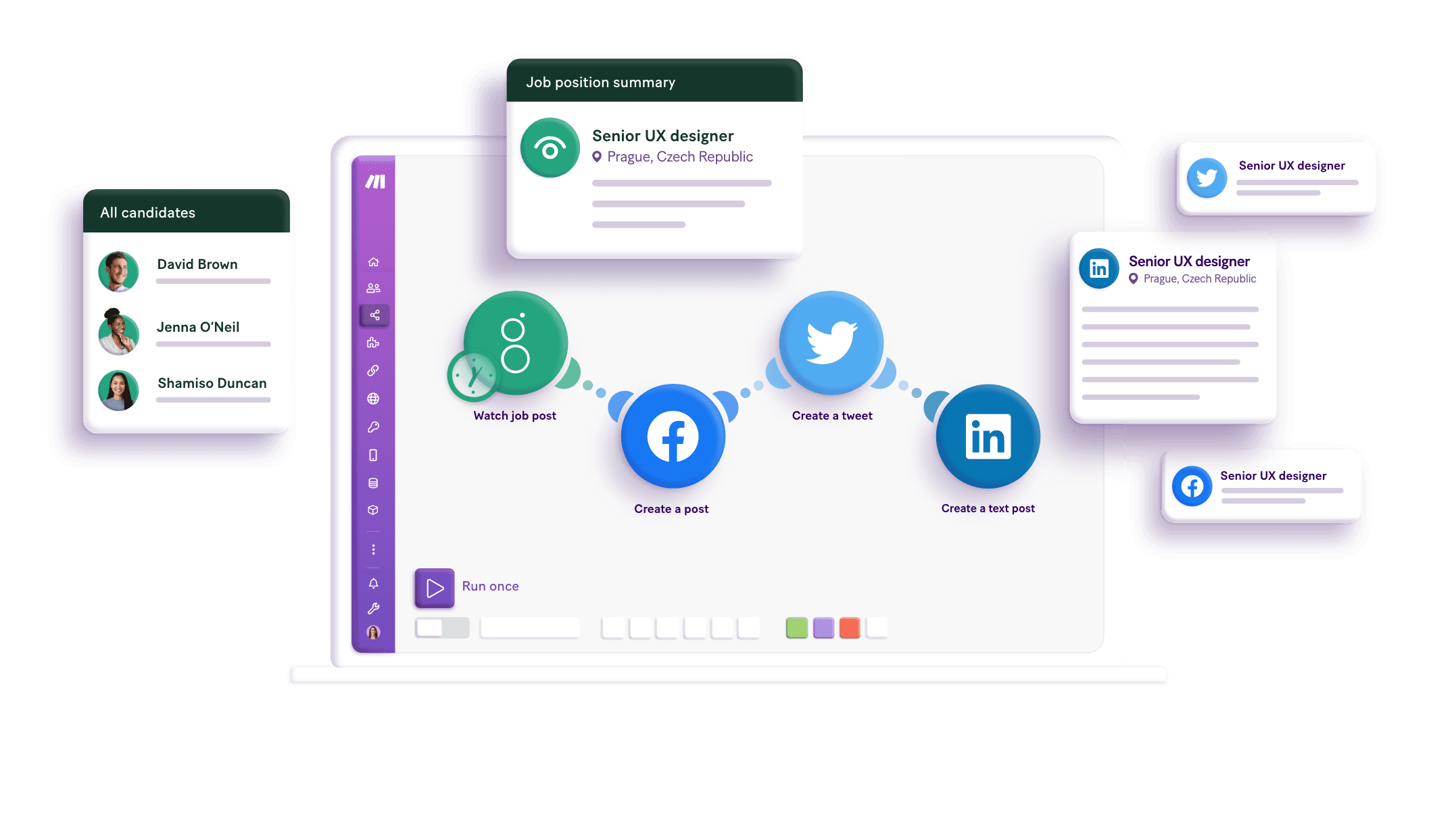Connect MonkeyLearn and Woobox integrations
Connect MonkeyLearn and Woobox with any of your favorite apps in just a few clicks. Design, build, and automate anything for your work by integrating apps like MonkeyLearn and Woobox to create visual automated workflows. Choose from thousands of ready-made apps or use our no-code toolkit to connect to apps not yet in our library.
Trusted by thousands of fast-scaling organizations around the globe






Automate your work. Build something new.
Just drag and drop apps to automate existing workflows or build new complex processes. Solve problems across all areas and teams.

Build your MonkeyLearn and Woobox integrations.
Create custom MonkeyLearn and Woobox workflows by choosing triggers, actions, and searches. A trigger is an event that launches the workflow, an action is the event.
Classifies the text with a given classifier.
Creates a new classifier.
Deletes a classifier.
Extracts information from the text with a given extractor.
Returns information about a classifier including its settings, stats, and tags.
Returns information about an extractor.
Returns all the available classifiers for the user.
Returns all the available extractors for the user.
Performs an arbitrary authorized API call.
Popular MonkeyLearn and Woobox workflows.
Looking to get more out of MonkeyLearn and Woobox? With Make you can visually integrate MonkeyLearn and Woobox into any workflow to save time and resources — no coding required. Try any of these templates in just a few clicks.
Analyze Google My Business reviews with MonkeyLearn and save it in Google Sheets
Every time a new review is added to your Google My Business location, Make will automatically analyze its sentiment (positive, neutral or negative) with a MonkeyLearn machine learning model. Then, the data is stored in Google Sheets. The template uses this [example spreadsheet](https://docs.google.com/spreadsheets/d/1XrTB8RgnTKwfADfk-aGqVNO0ftZubsNKdrKnLVFMOWw/edit?usp=sharing).
TRY IT ->Perform Dialogflow fulfillments with sentiment analysis
Every time a new Dialogflow fulfillment webhook is triggered, Make will automatically classify the query text by sentiment (positive, negative or neutral) with a MonkeyLearn Machine Learning model. Then, a specific fulfillment response is sent depending on the sentiment.
TRY IT ->Create a new contact in Automizy from a new participant in Woobox
When a new participant fills a form in Woobox, their address is validated using MailboxValidator. If the e-mail is valid, the participant is created as a new contact in Automizy.
TRY IT ->Register a new attendee in Stealth Seminar from a new participant in Woobox
When a new participant fills a form in Woobox, their address is validated using MailboxValidator. If the e-mail is valid, the participant is registered as a new attendee in Stealth Seminar.
TRY IT ->Create a new deal in Pipedrive from a new participant in Woobox
When a new participant fills a form in Woobox, their e-mail is verified using MailboxValidator. If the e-mail is valid, a new person and deal are created in Pipedrive CRM.
TRY IT ->Scrap prices from any page with HTML/CSS, Cloud Vision and MonkeyLearn
This template helps you perform data mining on on a website at regular intervals. First, a screenshot of the url is taken via HTML/CSS. Then, the screenshot's text is recognized with Google Cloud Vision (OCR) and the price is automatically extracted with a MonkeyLearn machine learning model. Eventually, the result is stored in Google Sheets.
TRY IT ->Analyze Google Sheets data with MonkeyLearn sentiment analysis models
Every time a new customer review is added to your Google Sheets spreadsheet, Make will automatically analyze its sentiment (positive or negative) with a MonkeyLearn machine learning model. The template uses this [example spreadsheet](https://docs.google.com/spreadsheets/d/1rc2IDYW_LiILIeVCzcEypn3yQIVB9QanHSyqnelvnJw/edit?usp=sharing).
TRY IT ->Analyze Airtable data with MonkeyLearn machine learning models
Every time a new record is added to your Airtable base, Make will automatically analyze its sentiment (positive or negative) with a MonkeyLearn machine learning model. The template uses this [example base](https://airtable.com/templates/sales-and-customers/expMR28Je36HIlrxw/customer-satisfaction-form-and-analysis).
TRY IT ->Train your MonkeyLearn machine learning model with a Google Sheets dataset
This template shows how you can take advantage of Make to train your MonkeyLearn model easily. Every time a new row is added to your Google Sheets spreadsheet, Make will automatically upload the data to your MonkeyLearn classifier. The template uses this [example spreadsheet](https://docs.google.com/spreadsheets/d/1aXcWQZGIK8c1mNquxxlSa0qLjIIyD3ye4V_ArhxN44E/edit?usp=sharing).
TRY IT ->
FAQ
How it works
Traditional no-code iPaaS platforms are linear and non-intuitive. Make allows you to visually create, build, and automate without limits.






